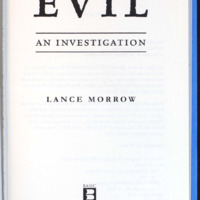-
Title
-
Evil: an investigation
-
Description
-
Drawing on examples both obscure and splashed across the front page, Morrow asks if, ultimately, we can understand evil - or if we even should. From Caligula to Columbine to his encounter with Milosevic, Morrow's stories are drawn from over thirty years of experience as a revered journalist and essayist. The result is a synthesis of a lifetime of observation that illuminates the chronically elusive, endlessly fascinating paradox that is evil.--BOOK JACKET.
-
Identifier
-
1133692
-
465047548
-
Creator
-
Morrow, Lance
-
Source
-
Brian Lamb Booknotes Collection
-
Gift of Brian Lamb, 2011.
-
Catalog record
-
Language
-
eng
-
Date
-
2003
-
Program air date: October 19, 2003
-
Publisher
-
Basic Books
-
George Mason University. Libraries. Special Collections & Archives
-
Text
-
Transcription of Annotations
Notes on front and back endpapers include references to Auschwitz, My Lai, Dunblane in Scotland, Pol Pot, Hitler's 'Mein Kampf', Stalin, Joe McCarthy, John Mohammad, Tim McVeigh, Elie Wiesel's, the author's and Abe Rosenthal's trip to Sarajevo and Bosnia, and the trivialization of evil by the way it is covered in the media. Other notes mention the globalization of communication, the abrupt technological shrinkage of the earth, the opposing terms 'enlightenment' vs. 'endarkenment', the mystery of why a good God permits evil in the world, and several stories and incidents that illustrate the nature of evil in the book. The following questions and statements are part of the notes: "Ask people to describe 'the most evil act'." - "Evil should not be used much, if at all, in diplomatic discussion." -- "What is TV doing for evil?" -- "Bush was wise to use the word evil in regard to 9/11 and terrorists." -- "Contrary to Sesame Street, the news about human nature is not all good." -- "Do you know anyone who is evil?" -- "Lesson of Vietnam [is] centered around [the] principle of American evil." -- Annotations by Brian Lamb in the margins and underlining of pertinent phrases throughout the book. -- Examples: p. 92: "Wealth seems to produce an enormous amount of evil in the world." -- p. 94: "Evil afflicts and infects all social classes." -- p.122: "It is dispiriting to arrive at last in the twenty-first century, a new millennium, and to understand how little human beings have to congratulate ourselves about, how little they have to show for the struggles that got them there." -- p. 152: "The American acceptance of permissible evil arises from the nation's immensely flattering conception of itself." -- p. 235: "The reality of evil is in the stories. And nowhere else." -- p. 266: "[The] opposite of evil is hope."
-
Subject
-
"Good and evil."
-
Relation
-
Original Booknotes interview
-
Rights
-
This work may be protected by copyright laws and is provided for educational and research purposes only. Any infringing use may be subject to disciplinary action and/or civil or criminal liability as provided by law. If you believe that you are the rights-holder and object to Mason’s use of this image, please contact speccoll@gmu.edu.
 1133692.pdf
1133692.pdf